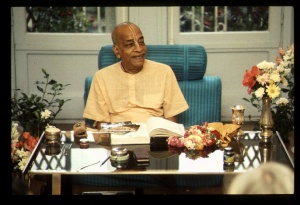CC Madhya 24.160: Difference between revisions
m (1 revision(s)) |
No edit summary |
||
| Line 1: | Line 1: | ||
{{ | [[Category:Sri Caitanya-caritamrta - Madhya-lila Chapter 24|C160]] | ||
<div style="float:left">'''[[Sri Caitanya-caritamrta|Śrī Caitanya-caritāmṛta]] - [[CC Madhya|Madhya-līlā]] - [[CC Madhya 24|Chapter 24: The Sixty-One Explanations of the Atmārāma Verse]]'''</div> | |||
<div style="float:right">[[File:Go-previous.png|link=CC Madhya 24.159|Madhya-līlā 24.159]] '''[[CC Madhya 24.159|Madhya-līlā 24.159]] - [[CC Madhya 24.161|Madhya-līlā 24.161]]''' [[File:Go-next.png|link=CC Madhya 24.161|Madhya-līlā 24.161]]</div> | |||
{{CompareVersions|CC|Madhya 24.160|CC 1975|CC 1996}} | |||
{{RandomImage}} | |||
==== TEXT 160 ==== | ==== TEXT 160 ==== | ||
<div | <div class="verse"> | ||
yadā hi nendriyārtheṣu | :yadā hi nendriyārtheṣu | ||
na karmasv anuṣajjate | :na karmasv anuṣajjate | ||
sarva-saṅkalpa-sannyāsī | :sarva-saṅkalpa-sannyāsī | ||
yogārūḍhas tadocyate | :yogārūḍhas tadocyate | ||
</div> | </div> | ||
| Line 14: | Line 18: | ||
==== SYNONYMS ==== | ==== SYNONYMS ==== | ||
<div | <div class="synonyms"> | ||
''yadā''—when; ''hi''—certainly; ''na''—not; ''indriya-artheṣu''—sense gratification; ''na''—not; ''karmasu''—in activities; ''anuṣajjate''—one becomes engaged; ''sarva''—all kinds of; ''saṅkalpa''—desires; ''sannyāsī''—renouncing; ''yoga-ārūḍhaḥ''—one who has actually attained perfection in the ''yoga'' system; ''tadā''—at that time; ''ucyate''—is said. | |||
</div> | </div> | ||
| Line 21: | Line 25: | ||
==== TRANSLATION ==== | ==== TRANSLATION ==== | ||
<div | <div class="translation"> | ||
"'When a person is no longer interested in acting for sense gratification and when he renounces all material desires, he is said to be situated in perfect yoga [yogārūḍha].' | |||
</div> | </div> | ||
__NOTOC__ | |||
<div style="float:right; clear:both;">[[File:Go-previous.png|link=CC Madhya 24.159|Madhya-līlā 24.159]] '''[[CC Madhya 24.159|Madhya-līlā 24.159]] - [[CC Madhya 24.161|Madhya-līlā 24.161]]''' [[File:Go-next.png|link=CC Madhya 24.161|Madhya-līlā 24.161]]</div> | |||
__NOTOC__ | |||
__NOEDITSECTION__ | |||
Revision as of 11:53, 14 September 2021
Śrī Caitanya-caritāmṛta - Madhya-līlā - Chapter 24: The Sixty-One Explanations of the Atmārāma Verse

His Divine Grace
A.C. Bhaktivedanta Swami Prabhupada
A.C. Bhaktivedanta Swami Prabhupada
TEXT 160
- yadā hi nendriyārtheṣu
- na karmasv anuṣajjate
- sarva-saṅkalpa-sannyāsī
- yogārūḍhas tadocyate
SYNONYMS
yadā—when; hi—certainly; na—not; indriya-artheṣu—sense gratification; na—not; karmasu—in activities; anuṣajjate—one becomes engaged; sarva—all kinds of; saṅkalpa—desires; sannyāsī—renouncing; yoga-ārūḍhaḥ—one who has actually attained perfection in the yoga system; tadā—at that time; ucyate—is said.
TRANSLATION
"'When a person is no longer interested in acting for sense gratification and when he renounces all material desires, he is said to be situated in perfect yoga [yogārūḍha].'